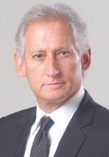A widow of an American Airlines executive and her two stepchildren may have secured an $8 billion jury verdict against J.P. Morgan Chase Bank a few months ago, but a hearing on attorneys’ fees in Dallas probate Court Thursday showed the battle to protect that verdict is just beginning.

Alan Loewinsohn, who represents the widow, Jo Hopper, argued to Dallas County Probate Judge Brenda Hull Thompson in an all-day hearing that she should affirm the jury’s ruling that Mrs. Hopper is owed $5.5 million in attorneys’ fees. But it will not be until March, when another hearing is scheduled, to determine how much of the Dallas jury’s $8 billion verdict – the largest jury award of 2017 – will be preserved.
Though the $5.5 million attorneys’ fees are just pocket change compared to the whopping $2 billion awarded to Mrs. Hopper alone, the circumstances behind the attorneys’ fees depict some of the core issues of the six-plus year legal battle.
Mrs. Hopper is the widow of longtime American Airlines executive Max Hopper, who pioneered American’s SABRE reservation system in the 1970s. When he died in January 2010, suddenly and intestate (without a valid will), Mrs. Hopper and her two stepchildren, Dr. Stephen Hopper of Oklahoma City and Prairie Village Mayor Laura Wassmer of Kansas, agreed to hire J.P. Morgan to help manage and divide Hopper’s complicated holdings.
In September, a six-person jury found that J.P. Morgan negligently, fraudulently and maliciously mishandled its fiduciary duty as the independent administrator of the estate, which was worth $19 million in assets and community property at the time of Hopper’s death.
At trial, the plaintiffs argued that the bank not only proved itself to be incompetent in completing this duty, but purposely performed the job in a manner that destroyed Mrs. Hopper’s relationship with her stepchildren.
Dr. Hopper and Ms. Wassmer (referred to as “the heirs” in the litigation) also argued that the bank fraudulently induced the family into giving the job to J.P. Morgan based on complete lies and misrepresentations. After the bank was hired, they claimed J.P. Morgan drained the estate dry by spending substantial amounts of the estate’s own money on the bank’s legal fees, which cheated the heirs out of their inheritances by millions of dollars.
Loewinsohn is not only vouching for the fees on behalf of his own firm, Loweinsohn Flegle Deary Simon, but also for the work of three other Dallas firms that represented Mrs. Hopper before Loewinsohn got involved in 2015.
The $5.5 million currently at stake can be broken into two subcategories: 1) the $4 million Mrs. Hopper paid in legal services to obtain a declaratory judgment that went all the way up to El Paso’s Eighth Court of Appeals involving a heated dispute of how J.P. Morgan should split the interests of the Hopper’s $1.2 million house between Mrs. Hopper and the beneficiaries of the estate (the two stepchildren), and 2) the $1.5 million Mrs. Hopper paid in legal services to obtain a ruling that she did not owe any attorneys’ fees to the estate.
“Step one was getting the jury finding that fees we are seeking are reasonable and necessary, which we did,” Loewinsohn recently told The Texas Lawbook, and step two is now “to get the judge – based on evidence occurred at trial – to decide how to allocate those fees.”
J.P. Morgan’s lawyers argued at Thursday’s hearing that Judge Thompson should not award Mrs. Hopper any of her attorneys’ fees. Alternatively, if she does decide to award attorneys’ fees, the amount should be no more than $357,500 and should be paid by the stepchildren, not the bank. As a last alternative, everyone should pay their own way, the bank’s lawyers said.
The bank argues that Judge Thompson should not award the fees because a bulk of them were related to her declaratory judgment matter on the house, which was a completely separate case from the issues argued in September’s trial. As a result, the court lacks jurisdiction, the bank says. Plus, J.P. Morgan adds, Mrs. Hopper should have brought any requests for attorneys’ fees when the separate declaratory judgment matter was litigated.
J.P. Morgan also argues that the fees are excessive – especially considering a bulk of them are related to a dispute over only $357,500 – and that the fees astronomically racked up as a result of the family feud between Mrs. Hopper and her stepchildren of how ownership interests in Mr. and Mrs. Hopper’s house should be divided which, it claims, also significantly delayed the division of that asset.
The house dispute escalated in June 2011 after the heirs hired Gary Stohlbach of Glast, Phillips & Murray as their new lawyer in the estate matter.
As Mrs. Hopper’s legal team summarizes it, Stohlbach began sending emails to J.P. Morgan threatening to sue the bank for breaching its fiduciary duty to the estate if it did not administer the million-dollar home by way of a partition, which would have required Mrs. Hopper to buy out the stepchildren’s 50 percent stake in the house at a price the court would decide. The partition also would have allowed the bank to take back assets already distributed to Mrs. Hopper to give to the stepchildren to help pay for their interest in the property.
Mrs. Hopper had argued all along that the house should be administered in undivided interests: 50 percent to her, 50 percent to the stepchildren. She had exercised her homestead right, which allows her to live in the house until the day she dies. To complete this task, all the bank had to do was fill out a two-page form, Loewinsohn said.
J.P. Morgan initially pushed back on Stohlbach, arguing that the law did not allow for a partition. But once a threat of a lawsuit came into the picture, the bank’s behavior changed, and became “more concerned about getting sued instead of doing the right thing,” Loewinsohn said.
“The bank pulled a 180. Instead of doing what it said it would do of filling out the form, it said, ‘We’re not doing anything. Instead we’re going to go to court,’” Loewinsohn said.
Van Beckwith, one of J.P. Morgan’s lawyers, disputed Loewinsohn’s characterization the series of events. Because the two parties wanted conflicting outcomes, he said J.P. Morgan had a legitimate right under the Declaratory Judgments Act to ask the court for guidance on what to do.
He pulled up a timeline for Judge Thompson that showed the court made its decision on this issue in May 2012, and one month later, J.P. Morgan distributed the house as Mrs. Hopper wished. He suggested it wasn’t the bank’s fault that Mrs. Hopper and the heirs continued to rack up legal fees after the bank distributed the house, which led to an opinion issued on the matter by the Eighth Court of Appeals in El Paso in December 2014.
But in a recent two-hour interview with The Texas Lawbook, Mrs. Hopper challenged J.P. Morgan’s statement about the $357,500 dispute (which is half the interest in the house) by asserting it is far from being just a six-figure dispute. She said the argument related to the house was actually over “millions of dollars.
“They don’t mention the $660,000 mortgage that I would have assumed,” she said. “They don’t mention that [they’re] going to apportion all the wine, golf clubs, furniture, artwork – everything to me. They don’t mention that they were going to charge me all the legal fees they could possibly charge me.
“It’s fun to be selective, but let’s be honest,” she continued. “Once they got a partition of the house, it would open the door… to partition everything.”
She also challenged the idea that there was a feud between her and the heirs. If there was, it was the bank’s fault.
“There was a war, but it was against J.P. Morgan,” she said. “My war was with J.P. Morgan. I didn’t know what the kids were doing… they did make and say accusations against me because they didn’t know any better. But had J.P. Morgan given them the facts that they had, the kids would not have been making those accusations.
“So there is not a blood feud so to speak between the children and I,” Mrs. Hopper continued. “I have deep empathy for them. I think they were violated as much as I was, if not more.”
Even so, Loewinsohn argued in court Thursday that the heirs should be responsible for some of the attorneys’ fees due to the complications Stohlbach’s incorrect legal conclusion about partitioning the house added to the litigation.
The heirs’ lead lawyer, Anthony “Lenny” Vitullo, disputed that argument, as well as the bank’s assertion that his clients should be responsible for all of the fees.

“I’m not saying J.P. Morgan Chase needs to write a check for $4 million to Jo Hopper; what I’m saying is, there’s absolutely no justification whatsoever for Stephen and Laura to be responsible for paying any of the attorneys’ fees,” said Vitullo, a partner at Fee, Smith, Sharp & Vitullo in Dallas.
“Mr. Beckwith said the right thing to do is for all parties to walk away and bear their own attorneys’ fees… That was Stephen and Laura’s money,” he said, alluding to the fact that J.P. Morgan took money from the estate to pay its own legal fees.
Vitullo also pointed out that despite Stohlbach getting involved, evidence showed at trial that J.P. Morgan had 14 months before Stohlbach was even in the picture to distribute the house – and that the bank’s own lawyers even admitted they could go ahead and divide the house as early as April 2010.
In the middle of his argument, Vitullo and Beckwith began firing back and forth about Vitullo’s attempt to admit portions of a 2016 deposition of Mrs. Hopper’s attorneys’ fees expert, named Lynn Pinker Cox & Hurst partner Trey Cox, into evidence.
In the deposition, Cox testified that no evidence suggests Mrs. Hopper ever sought for her attorneys’ fees to be paid by her stepchildren should she prevail on the issue.
The day before the hearing, J.P. Morgan filed a formal opposition to the evidence admission request, arguing in a seven-page response briefing that the law “prohibits reopening evidence after the jury has reached a verdict on an issue in controversy.
“Not only is the movants’ request improper… but it is also inconsistent with the positions they took at trial, during which they claimed to be adversaries concerning Mrs. Hopper’s claim for attorneys’ fees,” the bank’s briefing notes. “[The heirs] – after representing to this court and J.P. Morgan that they had a controversy with Mrs. Hopper concerning her request for attorneys’ fees against them – had their chance to question Cox at trial about Mrs. Hopper’s claim for fees and waived it by choosing not to ask him questions.”
Judge Thompson said she would “tentatively” allow it into evidence, but requested Vitullo to submit the entire deposition – not just a portion of it.
Beckwith spent a good portion of his argument grilling Cox’s expert opinion, which he said relied too heavily on fee statements that were so redacted that it didn’t allow Cox to examine the crucial information needed to come up with a proper amount of attorneys’ fees owed in the case.

He also took issue with the $4 million figure Cox came up with, pointing out that nearly $2 million of that amount was for Loewinsohn’s fees alone – despite the fact that the declaratory judgment issue was settled well before Loewinsohn got involved in 2015. On the timeline, he directed Judge Thompson to the fact that Mrs. Hopper had only incurred $960,000 in attorneys’ fees by the time J.P. Morgan distributed the house in May 2012.
“I am very surprised that in this case, on the declaratory judgment, which was a declaration over something that happened literally years ago, that Mr. Loewinsohn, who I consider a dear friend… is making a claim for $4 million when he was the new man on campus, and hadn’t even been involved,” Beckwith said.
Loewinsohn pointed out that Cox testified that a $625 per hour billable rate was “conservative” for the level of work needed – which included delivering Thursday’s labor intensive argument — and that it was still lower than the hourly rate of J.P. Morgan’s lawyers.
During rebuttal, Loewinsohn said the redactions in the invoices indicated the opposite of Beckwith’s suggestion that they were trying to hide something.
“I guess even though I’m Mr. Beckwith’s friend, he [has no reservations] of wanting to [associate] a bad motive on me,” Loewisohn said, pointing out the purpose of the redactions was to honor attorney-client privilege of sensitive pieces of information.
Loewinsohn agreed if Cox had relied only on the redacted invoices to deliver his opinion, he couldn’t have gotten the job done, but Cox conducted extensive research to deliver his expert report, including the review of 55 feet worth of documents – as high as Big Tex.
Though Beckwith led the hearing yesterday for J.P. Morgan, the Wall Street giant leaned on John Eichman of Hunton & Williams to lead the trial and most of the litigation. The bank decided to bring Beckwith on board around Christmas, as well as his Baker Botts colleagues Jessica Pulliam and Evan Young.
In addition to Vitullo, James S. Bell was the heirs’ other lead attorney at trial, but withdrew from the case after the verdict.
In addition to Loewinsohn, Mrs. Hopper was also represented at trial by Jim Flegle and Kerry Schonwald, also of Loewinsohn Flegle Deary Simon.
The hearing was originally scheduled to continue Friday, but the parties managed to conclude their arguments by EOB Thursday. Due to the quite heavy binder, lengthy PowerPoint and laundry list of caselaw the attorneys provided to support their arguments, Judge Thompson did not indicate when she would rule on the matter. She set a 10-day deadline for the attorneys to submit a few additional supplemental documents she said would aid her in her decision.
